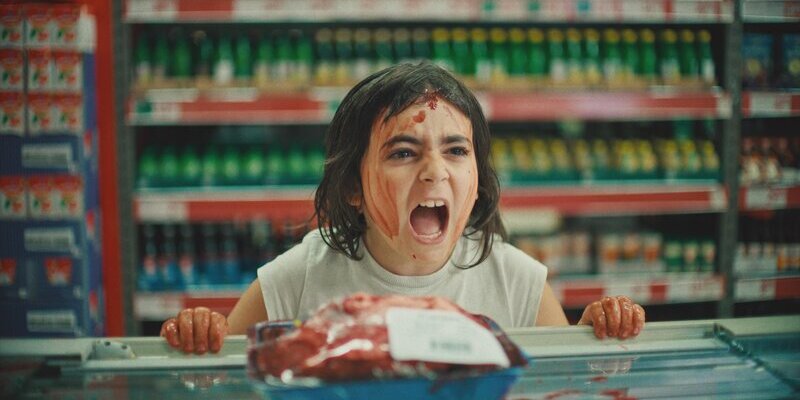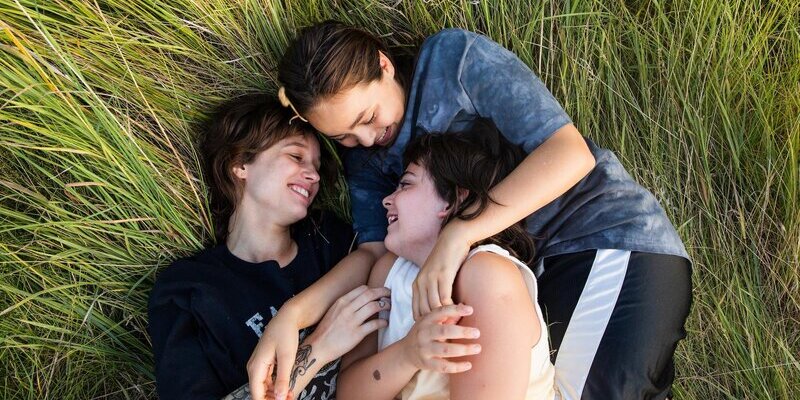
Review by Eric Hillis
Directed by: Mika Gustafson
Starring: Bianca Delbravo, Dilvin Asaad, Safira Mossberg, Ida Engvoll, Mitja Siren,
Marta Oldenburg, Andrea Edwards

If you enjoy female-centric Scandinavian coming-of-age stories like
We Are the Best!
and
Girls Girls Girls, you're in for a treat with Paradise is Burning, the narrative feature debut of Swedish documentary director
Mika Gustafson. Her film is also a Nordic cousin of recent
British films
Rocks
and
Scrapper, sharing the plot device of young girls left to fend for themselves in
the absence of a parent.
Left alone in their messy home on a working class estate are
16-year-old Laura (Bianca Delbravo) and her sisters, 12-year-old
Mira (Dilvin Assad) and six-year-old Steffi (Safira Mossberg). It's early summer and they haven't seen their mother since she
walked out on her kids at Christmas. The subtle ethnic disparities
between the three sisters suggests multiple fathers long since
disappeared, or perhaps that their mother may have been a sex worker.
Either way, Laura is in charge now. Objectively, she's doing a terrible
job. With no legal income, she resorts to breaking into empty homes in
the middle class part of her town, where she and her sisters and friends
often spend days partying in swimming pools. She allows Mira to drink
and smoke, and Steffi to wander off alone. The freezer is on the blink,
causing Laura to almost poison her sisters with rotten fish
sticks.

But Laura is trying her best, and likely hasn't exactly been set a
great example by her mother. Plus, the adults in her life aren't much
help. Her carny aunt's reaction to Laura's tale of woe is to send her on
her way with a couple of t-shirts. An aging neighbour, who might share
her mother's occupation, gives Mira tampons when she experiences her
first period, but she also gives the kid a jug of wine.
When Laura receives a call from social services looking to speak with
her mother, she manages to stall them but a meeting is called for the
following Monday. Laura approaches various adults and asks if they will
pose as her mother, but they all decline. Then, while fleeing the owner
of a home she broke into, Laura is given refuge in the home of Hanna (Ida Engvoll), an attractive thirtysomething who appears to be suffering from
postpartum depression, leaving her newborn in the frustrated hands of
her husband. The middle class Hanna develops a curious fascination for
Laura's wild ways, and insists that the teen take her on her next
expedition to break into a home. As the pair bond, Laura tries to find
the right moment to ask if she'll pose as her mother. She also develops
a crush on the older woman, and the feeling may be mutual.
While the bulk of the narrative is centred on Laura, we also spend time
with her siblings. Mira contends with puberty while acting as "manager"
for a depressed older neighbour who dreams of winning the local pub's
karaoke competition. Like Laura, she's positioned herself as a maternal
figure despite her young age. She acts tough but occasionally betrays
her innocence. The look of unbridled joy on Mira's face when Laura gives
her one of her aunt's t-shirts is simultaneously heartwarming and
heartbreaking.

Meanwhile, Steffi behaves like any six-year-old, seeing every new day
as a new adventure, making new friends, bringing home stray dogs and
occasionally getting herself into scrapes with some sinister older
girls.
While the girls are bonded by the familial blood that flows through
their veins, Gustafson also employs blood as a symbol throughout the
film. To cause a distraction in a shop so her sisters can steal food,
Steffi tears open a packet of steaks and smears blood on her face.
Laura's face is frequently bloodied from wounds inflicted by herself and
others. For Mira it's the blood of her first period. I'm not entirely
sure what this specifically symbolises but it's telling that the only
time the girls attract sympathy from adults is when they appear to
bleed.
The performances of all three young actresses are magnificent, with the
three performers cementing their stages of childhood: the innocence of
Mossberg's Steffi; the pubescent tug-of-war between late childhood and
early womanhood of Assad's Mira; the maternal burden foisted upon
Delbravo's Laura at a time when she should be savouring the last blooms
of her youth.

Drawing on her documentary past, Gustafson takes a verité approach. Her
camera is always physically close to her young stars but never
intrusive, always observational. Her film is free of adult judgment,
allowing the viewer to simultaneously frown at Laura's bad decisions
while also getting caught up in her infectious free spirit.
As the narrative ticks towards that fateful Monday meeting, our
feelings are torn between knowing that for the sake of herself and her
sisters Laura can't viably carry on with this charade, but we also don't
want to see this trio torn apart. The movie's closing scenes evoke that
knot in the stomach every teenager feels on the last weekend of the
summer holidays, when you've been allowed to simply be a kid for a few
weeks but must return to a world governed by adults, a world that makes
little sense for a teen and not much more for an adult either.
Paradise is Burning is a nostalgic treat for anyone who
fondly recalls the childhood joy of breaking adult rules.

Paradise is Burning is in UK/ROI
cinemas from August 30th.
